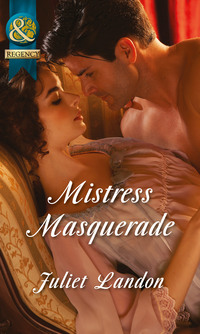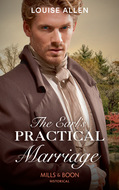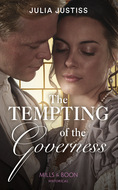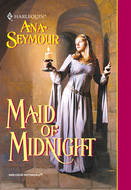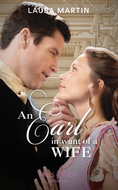Książki nie można pobrać jako pliku, ale można ją czytać w naszej aplikacji lub online na stronie.
Czytaj książkę: «Mistress Masquerade»
‘What kind of man do you take me for? A rogue, like Mytchett?’
‘Leave him out of it, if you please.’
‘Gladly. But answer my question.’
‘I cannot!’ she retorted, squirming against him. ‘All I know is that you have your orders and that’s why you’re here. How should I know what kind of a man you are, my lord? You must have heard how skilfully I form opinions in that direction.’
‘Yes, I have. Stop struggling and listen to me. This is not what you believe.’
‘You will never convince me of that, my lord. If I did not own something you’d been told to get hold of at any cost you would show no more interest in Lord Benistone’s scandalous daughter than in any other widow.’
Mistress Masquerade
Juliet Landon
MILLS & BOON
Before you start reading, why not sign up?
Thank you for downloading this Mills & Boon book. If you want to hear about exclusive discounts, special offers and competitions, sign up to our email newsletter today!
Or simply visit
Mills & Boon emails are completely free to receive and you can unsubscribe at any time via the link in any email we send you.
JULIET LANDON’s keen interest in art and history, both of which she used to teach, combined with a fertile imagination, make writing historical novels a favourite occupation. She is particularly interested in researching the early medieval and Regency periods, and the problems encountered by women in a man’s world. Her heart’s home is in her native North Yorkshire, but now she lives happily in a Hampshire village close to her family. Her first books, which were on embroidery and design, were published under her own name of Jan Messent.
Previous novels by the same author:
THE WIDOW’S BARGAIN
THE BOUGHT BRIDE
HIS DUTY, HER DESTINY
THE WARLORD’S MISTRESS
A SCANDALOUS MISTRESS
DISHONOUR AND DESIRE
THE RAKE’S UNCONVENTIONAL MISTRESS
MARRYING THE MISTRESS
SCANDALOUS INNOCENT
(collaboration with the National Trust)
SLAVE PRINCESS
Did you know that some of these novels are also available as eBooks? Visit www.millsandboon.co.uk
AUTHOR NOTE
The Regency, a period between the years 1811 and 1820, was dominated by George, Prince of Wales, eldest son of King George III and Queen Charlotte. He was a man of many facets, both attractive and ugly.
In 1811 George was required to take over his father’s duties because of a severe illness showing similar symptoms to insanity, projecting the young man into a situation he was unable to manage to anyone’s satisfaction—not even his own. This was not all his fault, but he was not a strong leader in any sense, preferring lavish displays of wealth and waste that drained the coffers dry at a time when funds were needed for the wars against Napoleon.
My depiction of him as an art-lover is fact, for he did indeed employ knowledgeable friends like Lord Hertford to act as buyer for his ‘newest toys’, Carlton House and Brighton Pavilion, on which he poured vast sums of money while at the other end of society thousands lived in terrible poverty after a series of bad harvests and severe winters.
In an otherwise intelligent and cultivated man, his insensitivity on a personal level was breathtaking, and it seemed to me, as a writer, that to include him in a story of this kind I must choose whether to concentrate on the sadness of his position or on his utterly reprehensible behaviour towards those he had once called his dearest friends. To allow Annemarie to rediscover her natural compassion I chose the former.
Emma Hamilton was one of those Regency characters whose colourful life needs no embellishment. Her story of ‘rags to riches’ both fascinates and repels us at the same time. It is an astonishing saga of how she exploited every attribute and talent she possessed to survive in a man’s world, becoming the mistress of several men in the process, including Lord Nelson. There is no evidence that she and the Prince Regent were actually lovers, but they were close friends—until Emma’s difficulties and demands became too much for him, when he failed to respond to her pleas for help.
Selfish to the last, George felt no responsibility to those he had once loved, though he kept thousands of love tokens, letters and mementoes. Again, one cannot help but find some sympathy for a woman like Emma Hamilton, so ill-used by her family and all those she had helped, who had taken full advantage of her generosity. Her ambition, apparent greed and amoral behaviour sometimes appear at odds with her naivety, innocence and longing for approval while expecting the same kindness from those she loved. I truly believe she could not tell her friends from her enemies most of the time. And that, sadly, was one of the greatest tragedies in her life, for she lived in the heart of a political and greed-ridden society whose loyalties dissolved faster than hers. Combine those expectations with a man like the Prince Regent and there is a recipe bound to collapse—like his protestations of eternal love.
Two such complex characters, so much to like and admire, so much to despise; their true stories are indeed stranger than fiction.
My main sources of information were The Prince of Pleasure by JB Priestley, which is now out of print, but there is plenty about George to be found in Ian Kelly’s brilliant book Beau Brummell, published by Hodder and Stoughton in 2006.
Kate Williams’s book, England’s Mistress, is all about Emma Hamilton and is excellent reading, published by Arrow in 2007.
Contents
Chapter One
Chapter Two
Chapter Three
Chapter Four
Chapter Five
Chapter Six
Chapter Seven
Chapter Eight
Chapter Nine
Chapter Ten
Chapter Eleven
Epilogue
Chapter One
London. June 1814
Lowering his morning newspaper with a loud crackle, Lord Benistone put down his magnifying lens and stared vacantly at the pot of marmalade, then across at his three daughters. ‘Poor unfortunate woman,’ he muttered. Two of them knew by the way he spoke that he was more likely to be thinking of their mother at that moment than the woman who featured, yet again, in The Times.
‘Obituaries?’ said Annemarie, his second eldest.
His eyes warmed at her assumption. ‘No, love. Not obituaries. Lady Emma Hamilton again. Another sale. She can have little more to sell now. You should go, Annemarie.’
‘To an auction? I think not, Papa. All the world will be there.’
‘I could request a private view for you. I can send a note to Parke at Christie’s. He’d allow it. I know you’d like something of hers, wouldn’t you? A memento? As an admirer?’
He’d got it wrong. Words of feeling were not his strong point. ‘Not so much admiration as sympathy,’ she said, ‘for the way she’s been treated since Lord Nelson’s death. All those wealthy friends and greedy relatives, and not one of them willing to help her out of her debts. She must be desperate by now.’
Her younger sister Marguerite’s opinion was only to be expected, particularly on a subject about which she knew little. At sixteen-and-a-half, she had still not learned the art of discretion. ‘I shall not be wasting my sympathy on a woman like that,’ she said, pushing her half-eaten breakfast away. ‘She’s brought it all on herself.’
It took much to make their father angry, but this hit a raw nerve and his hard stare at his youngest daughter would have made a bold man quake. ‘Marguerite,’ he said, softly, ‘I wish you would try to acquire the habit of thinking before you speak before it’s too late to make a lady of you. For one thing, no woman brings it all on herself. And for another thing....tch! Never mind. You wouldn’t understand.’
Even Marguerite knew then that he was thinking of their mother.
Oriel, the eldest sister, glanced at her sideways and pushed the plate back into place with one finger. ‘Unladylike,’ she said. ‘And I think an apology is called for.’
‘I’m sorry, Papa,’ Marguerite whispered. ‘I spoke rashly.’
‘No harm, child,’ he said, nodding. ‘No harm.’ The morning sun caught the top of his silvery hair as he looked again at Christie’s announcement. ‘You go and take a look, Annemarie. I don’t know whether she’ll have saved the best or the rubbish till last, but you may find something to take down to Brighton with you.’ At sixty-eight he was still a handsome man, in spite of the lack of exercise.
‘What are you looking for?’ said Oriel. ‘I wouldn’t have thought anything of Lady Hamilton’s would be to your taste. A little too flashy, perhaps?’
‘I’ve no idea. Something small, I suppose.’
Annemarie saw the flicker of amusement pass across her father’s face at that. There was barely a square inch of space at their Montague Street home that was not occupied by his well-known collection of antiquities, and he knew as well as she that by sending her to Christie’s auction rooms in his stead, his own curiosity would be assuaged without the temptation to buy. Even Lady Hamilton’s last pieces would reveal something of quality, if not rarity, for she and Lord Nelson had been presented with gifts from every corner of the world. Annemarie was due to return to her own house at Brighton the next day, so it seemed like a last chance to find something that would fit. Something small.
* * *
Only one hour later, a note was delivered to Montague Street assuring Lord Benistone that Mr Parke, Christie’s senior valuer, would be delighted to show Lady Annemarie Golding over the most recent acquisitions.
* * *
So it was that, by mid-afternoon, she had chosen not the small thing she’d intended, but one of a pair of matching bureau dressing-tables made by the elder Chippendale, no longer in the height of Regency fashion but exactly what she needed for her bedroom. She would have bought its twin also, but did not need two of them as Lady Hamilton and Lord Nelson apparently had. Widows such as herself only needed one of anything. The generous price of it, however, was certain to relieve the poor lady’s acute embarrassment more than all the other clutter she was selling, except for its twin which Mr Parke assured Lady Golding he would sell for at least as much. Even so, he pointed out that he knew of no one who would want to purchase the pair and was relieved to have got one of them out of the way so quickly.
* * *
It was delivered to Montague Street that very same day and, smoothing a gnarled hand over the rosewood surface, Lord Benistone bent to examine the delicate inlay, the pretty brass handles, the honeyed tones of the veneer, his fingertips reading the patterned woods as if they were words. ‘I’ll have it packed straight away for you,’ he said, ‘and ready for the wagon first thing in the morning. Will that do?’
‘Thank you, Papa,’ Annemarie said, glancing round the great hall where the brown bureau looked so ill at ease amongst the white carved reliefs and contorted stone figures, the smooth busts of Roman matrons, the urns and plaques. There was no point in repeating the countless invitations to go with her to Brighton. He would never leave his beloved collection, not even for a few days of bracing sea air, especially now when the whole of Europe was flocking to London for the end-of-war celebrations. The possibility of meeting other antiquarians was too good to miss. She could hardly blame him when she was using the same reason to escape to deserted Brighton where she was unlikely to meet anyone who knew her.
The other reason, she had to admit, was that the beautiful house on Montague Street had become more like a museum than a home and she longed for the white-and-pastel space of her own elegant rooms where she was not swamped by sculpted pieces of enormous proportions or paintings covering every vertical surface. They were even stacked against the furniture now, finding their way into the bedrooms, preventing the housemaids from cleaning and the housekeeper from keeping order. Entertaining had been out of the question for years unless the guests were fellow-collectors, making for some very one-sided conversations. It was not difficult for any of them to understand why their mother had left last year, although the manner of her leaving was another thing entirely. That would be even harder to understand and not a day passed when Annemarie did not feel the wound it had left.
They never spoke of it, papa and his daughters, but now it seemed as if something had tweaked at that raw nerve again as the day of Annemarie’s departure drew nearer and his usually clear voice faltered as his hands ceased their caress of the rosewood. ‘This thing will be all right,’ he whispered, ‘but it’s you I’m concerned about, lass. You’ve been more affected by what happened than your sisters and, at twenty-four years old, it’s time you found somebody else to take care of you properly. Holing yourself up by the sea is hardly the right way to go about it, is it? And when I’m no longer...’ His voice trembled on a sob as the thought took over. ‘I ought to have seen it coming, oughtn’t I?’
Annemarie had not seen him like this before. Taking him into her arms, she hushed him with mothering sounds and felt him tremble as if a cool breeze had ruffled him. Then he was still again, composed and dignified, determined not to be seen caring too deeply for his loss. It was affairs of the heart that had been his undoing. That, and a disastrous misdirection of his attention. Perhaps there was more of him in young Marguerite than he cared to admit.
Withdrawing from her comfort, he sniffed and pushed a tear away with a knuckle, smiling thinly at the unusual lapse. ‘You’re so like her,’ he said, touching her cheek. ‘Oh, I don’t mean like that. I mean in looks. The way she was when I first saw her: same glossy black hair, velvet skin, amethyst eyes. A beautiful creature.’
She smiled. What loving father did not think his daughters beautiful?
* * *
Later, she tried her persuasions on Oriel. ‘I wish you were coming with me,’ she said as they watched Marguerite disappear with a swirl up the wide staircase still in a state of agitation from breakfast.
‘And I wish you were staying here with us,’ Oriel said, tucking her hand through her sister’s arm. Upstairs, a door slammed and her soft grey-blue eyes rolled heavenwards before turning to Annemarie’s.
‘She means no harm, love.’
‘She doesn’t have the sense to mean anything,’ said Oriel ‘That’s the problem. We never know what she’s going to say...or do...next. That’s why it’s best if I stay here to keep an eye on her. Besides....’
‘Yes, I know. You have Colonel Harrow. I would never drag you away from him, just to keep me company.’
Oriel blushed, her smile lighting up her serenely lovely face like sunshine on water. Annemarie picked up the hand that was through her arm to check on the sapphire-and-diamond engagement ring. Colonel Harrow was fortunate to have won her and not for the world would Annemarie have claimed priority when the couple had so recently been reunited after his return from the Peninsula Wars. Oriel’s relief to find him unharmed after so much hard fighting against Napoleon’s forces had moved them all to tears of joy, especially after Annemarie’s own late husband had fared less well. As a couple, Oriel and William were now able to take part in the celebrations that would last for months, if the Prince Regent could find the funds to pay for them.
Oriel shared in the study of her ring. ‘It’s not only that,’ she said. ‘It’s Father too, isn’t it? He prefers it if one of us is here to show his visitors round the collection and Marguerite is no help because she doesn’t know the first thing about it. At least we can tell Egyptian from Assyrian.’
Giggling at the mental picture of Marguerite’s carefully cultivated ignorance, Annemarie could not suppress the uncharitable retort, ‘Yes, and the longer she refuses to learn, the less likely she’ll be asked to help. She knows that, the little minx. And Papa knows it, too. He should take a stronger line with her.’
‘He did at breakfast though, didn’t he?’
‘He should do it more often.’
‘She takes notice of Cecily,’ said Oriel, wiping a finger over the stone curls of a Roman’s beard. ‘This one hasn’t been dusted lately.’
‘Thank heaven for Cecily. She’s a saint.’
Father’s widowed cousin Cecily was in a perfect position to visit their London home as one of the family while keeping her own luxurious house on Park Lane as an escape from the comings and goings of visitors to their papa’s “museum”. Quite often, Marguerite would stay overnight with her when a chaperon was required for an evening event, an arrangement that suited them all for a variety of reasons. Cecily had been the one to sponsor Marguerite’s coming-out ball last summer, and now she was just as likely to appear at the Montague Street breakfast table as Marguerite was at hers.
‘You ought not to be travelling down to Brighton on your own, though,’ Oriel said. ‘You know Father doesn’t like it above half. Won’t Cecily go with you?’
‘I would not want her to,’ Annemarie replied. ‘I’d rather she stayed where Marguerite is, while she’s flitting about from party to picnic every day. She’s quite determined to go to Lady Sindlesham’s ball tonight, you know, and Papa doesn’t seem at all concerned. Cecily is needed here. Anyway, love, I shall hardly be on my own with a maid and two coachmen, shall I? I’m not likely to come to any harm between here and the coast.’
‘You’re getting to be a recluse, Annemarie. It cannot be good for you.’
‘It’s best,’ she said, not wanting to explain.
‘Think of all the evening dresses. You know how you love dressing up.’
‘Don’t, Oriel. It doesn’t help.’
But it was true. To wear the newest fashions had always been one of her weaknesses, but without that frisson of excitement at the admiration they caused, the exercise seemed pointless when the stares she received would be laced with pity and curiosity to see how she was surviving last year’s scandal. She was not prepared to face that. Not yet.
Oriel’s arm squeezed hers, understanding. When Mama was with them once again and Annemarie began to show signs of taking her place in society, she and her handsome colonel would name a date for their marriage. It was typical of her that she would not put a seal on her own happiness before everyone else’s was assured. But never once had the two older sisters doubted that, one day, Mama would reappear and that their lives would then begin a return to normality.
It gave her sister no pleasure to keep them waiting, but for the life of her, she could find no way forwards.
* * *
The well-dressed delivery man touched the brim of his top hat. ‘Thank-ee, m’lord. Very generous, m’lord. Any time.’ A real swish beau, that one, he said to himself, watching the long stride disappear round the corner. It was one thing to be in such a cove’s good books, but that man could do some serious damage if the opposite applied, if those shoulders and that deep barrel of a chest were any indication, yet the blue superfine sported not one crease. Pocketing the gold coin, he patted the embroidered lettering on his black-velvet lapel that said, ‘Christie’s of London’ before climbing up on to the wagon to sit beside his mate. ‘It don’t get much easier than that, Rookie,’ he grinned.
‘Blabbermouth!’ replied Rookie, good-naturedly flipping the reins. ‘Giddup!’
Returning to the front of Christie’s Auction House, the admired beau climbed into his own conveyance, a cream-and-black curricle of exquisite delicacy, took the reins and whip into his gloved hands, nodded to his groom and moved away along King Street heading northwards, quite unaware of the admiration he had aroused.
Montague Street, he said to himself. That would be Benistone’s place, of course, a collector better known for his Greek and Roman artefacts and old masters than furniture. One of the best collections in London, so the Prince Regent believed. Sadly, Lord Benistone had suffered some notoriety over the loss of his beautiful ex-courtesan wife who had run off with the suitor of one of his daughters last year. He himself had been away in the Peninsula with Wellington at the time, so knew little of the details. The elderly father had never been a socialite, and what the daughters were like he did not know, though he’d heard that one of them had her mother’s looks, which might explain why that short-sighted worm Mytchett had taken what was on offer. His curiosity sharpened.
* * *
At Number Fourteen Montague Street, Lord Benistone’s butler was apologetic. The master was not at home. He was across the road in the British Museum. He liked to take a look at least once every two weeks. Would Lord Verne like to return tomorrow? Leave his card?
No, Lord Verne thought he could do better than that, though it would not do to betray his impatience. In the marbled hall lined with art objects, he had detected a white pedestal that had moved, very slightly, in a shadowy corner by the staircase. He took a chance. ‘I wonder...is Lord Benistone’s daughter at home? I have not yet had the pleasure of the lady’s acquaintance, but His Royal Highness the Prince Regent...ah!’
The pedestal moved forwards very slowly into the light and became a tall shaft of creamy-white flowing muslin topped by a scoop of peachy skin, a long neck unadorned except by wisps of escaping hair that curved on to her shoulders, the remainder of which was piled up into a gloriously untidy mass of glossy blackness that had obviously been set up there without mirror or abigail.
There were very few times when Lord Verne was bereft of speech, being an erudite man known for his ability to handle any situation with astonishing efficiency, but this was one of those times. Aware that his incredulous stare would be taken for incivility if he didn’t utter some kind of sound in the next three seconds, he let out his breath on a narrowly avoided whistle. ‘Miss...er...Benistone?’ he said. ‘I hope you’ll forgive my intrusion.’
Her black-rimmed gemstone eyes glared at him from beneath finely curved brows, one of which was cleft by a loosened ringlet that on any other woman would have signified untidiness, but on her was sensational. So, this could be the jilted daughter. If the mother looked anything like this, Verne thought, who could have refused her? But the amazing eyes remained stony and one could not have said that her welcome was even lukewarm as she stayed well out of reach. ‘No, we have not met, sir. I am Lady Golding, Lord Benistone’s second daughter. And you are?’
‘Lord Verne. At your service, ma’am.’ The use of his title, he thought, was justified on this occasion.
‘Then, in the absence of someone to introduce us, I suppose that must suffice. How do you do?’ Gracefully, she inclined her head in what he knew to be the precise degree demanded by etiquette and not one jot more. His own slight bow matched hers. He had no intention of offering more in civilities than she did. She adjusted a frill over her other wrist before clasping her hands beneath the high bodice of her gown.
The butler bowed and took Lord Verne’s hat and gloves and placed them on a vacant corner of the book-piled hall table before leading the way to a morning room that had now become a repository of treasures. There was very little room for manoeuvre, yet he was both surprised and amused when the butler, without being prompted, propped the door wide open with a gigantic plaster cast of a foot before leaving them alone. If one could be alone in such exalted company.
‘Casts of Michelangelo’s David,’ said Annemarie, noting his interest. ‘Here’s his nose and one of his hands.’ She blew a cloud of dust off it. ‘May I ask your business, my lord?’ Still no smile.
He decided to press for one. Foolishly, in retrospect. ‘Yes,’ he said, looking about him, ‘it would be difficult to get the rest of him in here without chopping him into further little bits, wouldn’t it?’
‘You mentioned the Prince Regent just now. Was there a reason for that?’ she said, ignoring his attempt at levity. She obviously did not appreciate having to deal with visitors, even noble ones, who turned up on the doorstep without a ticket expecting to be shown round individually. She would expect them to apply for the usual days: Mondays, Wednesdays and Saturdays. ‘Does his Highness wish to see the collection, perhaps?’
Verne accepted defeat. She was not going to thaw. ‘I mentioned the Prince Regent, my lady, because he has commissioned me to find something for him.’
Annemarie glanced sideways at the dusty piles of books, vases and body parts waiting to be catalogued. ‘Really. And would you know it if you saw it, my lord?’
So, she needed to be told that she was not talking to an ignoramus. Idly following her glance, he was needled into a retort. ‘Well now, I’d know that the hand you’ve just dusted off is by Bernini, not Michelangelo, like the nose. And I’d know that this bowl here is sixth century bc Attic and that you should put it somewhere safe. It’s a very rare piece. And behind you is an El Greco, if I’m not mistaken.’
‘It is!’ Annemarie retorted sharply. ‘What is it you’re looking for?’
Right. Now we’re level, Lady High and Mighty Golding, née Benistone.
‘For a Chippendale bureau. Oak, mahogany and pine, mostly.’
‘As you see, my father is not a collector of furniture. That is why I cannot ask you to sit. Most of our chairs are used for...other things...’
‘Yes, quite. But I was led to believe, my lady, that a Chippendale bureau was delivered to this address only today. The day before the Hamilton auction.’
A quick frown shadowed her face. ‘Mr Parke promised me—’
‘It was not Parke who gave me the information,’ he said. ‘I did not even ask him for it. One does not need to go to the horse’s mouth to find things out, if you’ll excuse the expression.’
‘I’m familiar with the Christie organisation, I thank you. I can guess how you made your discovery But you are wasting your time, my lord. There is no bureau here. Where on earth would we put such a thing?’
‘His Highnesss will be very disappointed. He’s offering a good price for it.’
‘Well, that’s not my concern. Why does he want it so much?’
‘The Prince’s buyer visited Christie’s auction rooms at mid-day and found that the pair had been split up. His Highness was very put out. He wants the pair, you see, and at the moment he has only one. He sent me to search for it’s twin.’
Angrily, she looked away, making it clear that knowledge of who had purchased the bureau was the very thing she had wished to avoid. Verne noted the angry flush and felt a moment of sympathy for this ravishing creature hiding herself away in this museum-like cavern with an ageing father and a heart growing cold with bitterness.
As if summoned by the butler, a well-dressed middle-aged lady appeared, entering from the hall with plenty of warning and looking from Annemarie to her visitor with a smile. One glance at the fair ringlets, the plump figure and the brightly rouged cheeks warned him that she was probably not one of the sisters.
‘Cecily, my dear,’ said Annemarie, ‘allow me to introduce Lord Verne. Mrs Cardew, my lord. My father’s cousin.’
‘Ma’am.’ This time, his bow received a smile in return.
‘My lord. You were hoping to meet Lord Benistone? Oh dear. He’s late.’
‘I was hoping to find Lord Benistone and a certain bureau, ma’am.’
Annemarie’s quick frown would have cracked a Greek urn, but it went unheeded. Mrs Cardew preferred him not to leave without some discussion. She was never usually so blind to Annemarie’s signals. ‘Oh, that,’ she said. ‘What a pity you’ve just missed it. It’s just been loaded on to the—’
‘That’s what I told his lordship,’ said Annemarie, stepping in quickly to stem the verbal flow, ‘that it’s not here.’
‘It’s going down to Brighton, you see,’ continued Mrs Cardew, brightly. ‘It’s for Lady Golding’s personal use.’
‘And it’s not for sale. Now, if you’ll excuse me, my lord, I have things to do.’
‘Ah, so it was here,’ Verne said, determined to persevere rather than be sent off with the flea in his ear that Lady Golding had in mind for him.
‘That is quite irrelevant, my lord,’ said Annemarie, sending him a withering look. ‘I’ve said it’s not for sale. Naturally I am mortified that his Royal Highness will be disappointed. Indeed, I shall probably lose a week’s sleep over it. I hope he soon recovers and finds something else he cannot live without. A diamond-studded horseshoe, for instance? A gold-plated handkerchief? A hair from the Great Chan’s beard? Poor man. So much wealth to get rid of.’
‘Annemarie, you must not say such things. Lord Verne and the Prince are sure to be close friends.’
‘Yes, I imagine they must be if all they have to do is to chase round London after things they can’t have.’
Taken aback by Annemarie’s sharpness, Mrs Cardew responded to a sudden clatter in the hall that heralded the arrival of the one who could save a difficult situation: Lord Benistone himself. She went off to investigate.
Lord Verne, however, placed himself between the door of the morning room and Lady Golding. He’d be damned if he’d let her have the last word. His voice was little more than a growl meant for her ears alone, spoken while their eyes locked together like cold steel. ‘I rarely chase after things I can’t have, Lady Golding. When I see what I want, I pursue it. And I usually make it mine.’
Darmowy fragment się skończył.

